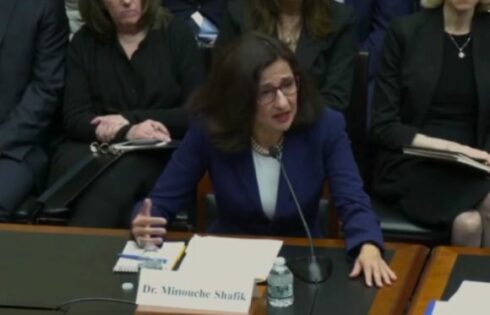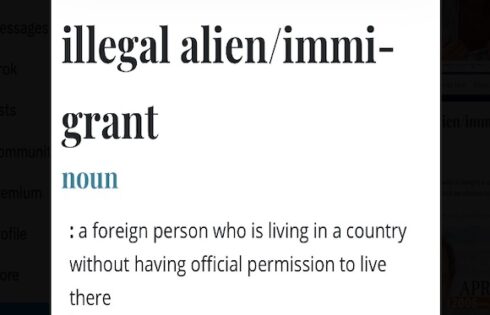
But legislation risks punishing lawful speech against Israel
With the United States experiencing a surge in reported incidents motivated by anti-Semitism, some are looking to college campuses to take a more proactive approach.
Just before Christmas the U.S. Senate approved the Anti-Semitism Awareness Act, sponsored by Democratic Sen. Bob Casey and Republican Sen. Tim Scott, and sent it to the House Judiciary Committee.
The bill would require the Department of Education to use the State Department’s definition of “anti-Semitism” – which includes “demonizing Israel” – when evaluating “whether the alleged practice was motivated by anti-Semitic intent.”
Virginia state lawmakers introduced a similar bill (HB 2261) last month that would include anti-Semitism in the state’s definition of discrimination “on the basis of religion.” It would also use the State Department’s definition.
MORE: UTK warned to denounce anti-Semitic posts or lose its funding
Other examples of anti-Semitism from State’s definition include accusing Israel “of inventing or exaggerating the Holocaust” and accusing non-Israeli Jews “of being more loyal to Israel … than to the interest of their own nations.”
In a survey of Jewish students eligible to take summer 2015 Taglit-Birthright Israel trips by Brandeis University’s Center for Modern Jewish studies, more than half reported experiencing or witnessing anti-Semitism in 2014 and 2015.
“Substantial evidence shows an uptick of anti-Semitism on campus,” Kenneth Marcus, president of the Louis D. Brandeis Center for Human Rights Under Law and author of The Definition of Anti-Semitism, told The College Fix.
“And while some forms are dealt with well, universities only respond well to swastikas,” said Marcus, who supports the federal and Virginia bills.
UH students want leaders to respond to anti-Semitic tweets. https://t.co/m5iPC6mPUA
— Kenneth L. Marcus (@Klmarcus) February 3, 2017
MORE: Reported suppression of Jewish student speech doubles in a year
Highlighting a perceived double standard, Marcus said that “right-wing incidents of anti-Semitism are well addressed,” but those coming from the left are “largely ignored.”
Despite reported incidents involving “assault and battery” and social media postings that “praise Hitler” and “advocate for violence against pro-Israel activists,” the Department of Education’s Office for Civil Rights “has not found a single civil rights violation on any campus anti-Semitism case,” he said.
The Anti-Semitism Awareness Act would not restrict students’ First Amendment rights, according to Marcus, because it would only deal with criminal incidents after the fact and then use available information to “determine intent.”
Better to codify ‘peer-on-peer harassment,’ constitutionally
But some civil liberties organizations have voiced concerns.
The Foundation for Individual Rights in Education (FIRE) has argued that notwithstanding the bills’ acknowledgement of students’ First Amendment rights, using the State Department’s anti-Semitism definition would “likely violate” their free speech, at least at public universities.
Joe Cohn, FIRE’s legislative and policy director, suggested legislation could turn constitutionally protected speech into harassment.
“There have been disturbing examples of harassment against Jewish college students in recent years,” he told The Fix. “However, we have also seen criticism of Israel that clearly constitutes protected speech deemed harassment.”
MORE: UC considers unconstitutional speech codes to punish anti-Semitism
https://twitter.com/nsmartinworld/status/826907937683562497
Defining anti-Semitism legislatively “would further exacerbate this problem,” Cohn said, calling the State definition “too vague” and “likely to cause problems.”
Cohn explained how many issues arise due to the channels that are charged with handling issues of discrimination. Title IV of the federal code deals with religion and its cases are handled by the Justice Department, whereas Title VI cases deal with race and are handled by the Department of Education.
Due to issues arising from the channels responsible for addressing discrimination incidents, an act which specifically dealt with incidents pertaining to “cultural heritage” would be “a better way forward,” he said.
A simpler route for protecting Jewish students is “codifying a constitutional definition for peer-on-peer harassment,” Cohn continued. Lawmakers can also make clear that “harassing behavior targeted against Jewish students because of their ethnic or cultural heritage is prohibited, just as it would be if the harassment was based on Jewish religious beliefs.”
This has the benefit of applying to “students of all faiths who may face similar discriminatory harassment,” he added.
MORE: Not a good year for Jewish students at California colleges
Like The College Fix on Facebook / Follow us on Twitter
IMAGE: Elnur/Shutterstock




Please join the conversation about our stories on Facebook, Twitter, Instagram, Reddit, MeWe, Rumble, Gab, Minds and Gettr.